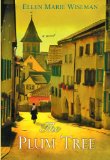Summary | Discuss | Reviews | More Information | More Books

A deeply moving and masterfully written story of human resilience and enduring love, The Plum Tree follows a young German woman through the chaos of World War II and its aftermath.
"Bloom where you're planted," is the advice Christine Bolz receives from her beloved Oma. But seventeen-year-old domestic Christine knows there is a whole world waiting beyond her small German village. It's a world she's begun to glimpse through music, books--and through Isaac Bauerman, the cultured son of the wealthy Jewish family she works for.
Yet the future she and Isaac dream of sharing faces greater challenges than their difference in stations. In the fall of 1938, Germany is changing rapidly under Hitler's regime. Anti-Jewish posters are everywhere, dissenting talk is silenced, and a new law forbids Christine from returning to her job--and from having any relationship with Isaac. In the months and years that follow, Christine will confront the Gestapo's wrath and the horrors of Dachau, desperate to be with the man she loves, to survive--and finally, to speak out.
Set against the backdrop of the German home front, this is an unforgettable novel of courage and resolve, of the inhumanity of war, and the heartbreak and hope left in its wake.
"A story of human survival and enduring love despite insurmountable odds, it's an original and important addition to the World War II canon." - RT Book Reviews, 4.5 stars, Top Pick!
"The Plum Tree starkly reminds us that war is hell for everyone. You won't be able to put this vivid tale of love and survival down." - Historical Novels Review
"The Plum Tree is a touching story of heroism and loss, a testament to the strength of the human spirit and the power of love to transcend the most unthinkable circumstances. Deft storytelling and rich characters make this a highly memorable read and a worthy addition to the narratives of the Holocaust and Second World War." - Pam Jenoff, author of The Ambassador's Daughter
"A haunting and beautiful debut novel." - Anna Jean Mayhew, author of The Dry Grass of August
"In The Plum Tree, Ellen Marie Wiseman boldly explores the complexities of the Holocaust. This novel is at times painful, but it is also a satisfying love story set against the backdrop of one of the most difficult times in human history." - T. Greenwood, author of Two Rivers
This information about The Plum Tree was first featured
in "The BookBrowse Review" - BookBrowse's membership magazine, and in our weekly "Publishing This Week" newsletter. Publication information is for the USA, and (unless stated otherwise) represents the first print edition. The reviews are necessarily limited to those that were available to us ahead of publication. If you are the publisher or author and feel that they do not properly reflect the range of media opinion now available, send us a message with the mainstream reviews that you would like to see added.
Any "Author Information" displayed below reflects the author's biography at the time this particular book was published.
Ellen Marie Wiseman discovered her love of reading and writing while attending first grade in one of the last one-room schoolhouses in New York State. Her debut novel The Plum Tree - a WWII story about a young German woman trying to save the love of her life, a Jewish man - will be released by Kensington in January 2013. Ellen lives peacefully on the shores of Lake Ontario with her husband and three dogs, where she loves to cook, watch movies, garden, and spend time with her granddaughters. She would love to have you join her on Facebook, Twitter, and on her web site: www.ellenmariewiseman.com
Your guide toexceptional books
BookBrowse seeks out and recommends the best in contemporary fiction and nonfiction—books that not only engage and entertain but also deepen our understanding of ourselves and the world around us.